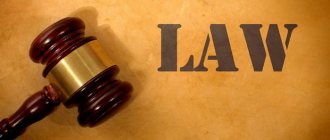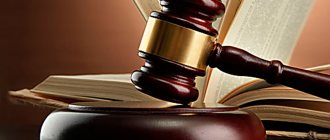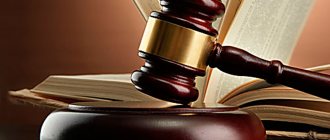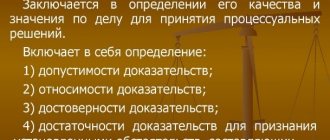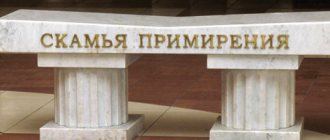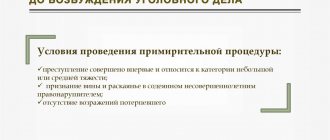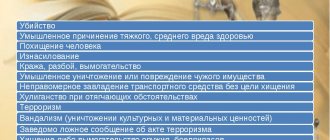One of the forms of legal assistance provided by a lawyer is participation as a representative or defender of the client in criminal proceedings. In criminal proceedings, a lawyer can act on the side of both the defense and the prosecution. A lawyer is a representative of the prosecution in cases where he defends the interests of the victim, civil plaintiff and private prosecutor (Part 1 of Article 45 of the Code of Criminal Procedure of the Russian Federation). How does a lawyer participate in criminal proceedings?
On the defense side, the lawyer has the powers of a defender, i.e. a person who, in accordance with the procedure established by law, protects the rights and legitimate interests of suspects and accused and provides them with legal assistance in criminal proceedings (Part 1 of Article 49 of the Code of Criminal Procedure).
A lawyer has the right to act as a representative of a civil defendant (Part 1 of Article 55 of the Code of Criminal Procedure).
The suspect's lawyer is allowed to participate in a criminal case:
1. from the moment a criminal case is initiated against a person, which is investigated in the form of an inquiry in accordance with Art. 223 art. 150 Code of Criminal Procedure of the Russian Federation. If a criminal case initiated against a specific person is subject to investigation in the form of a preliminary investigation, then the suspect’s lawyer is allowed to participate in the case from the moment the decision to order a forensic psychiatric examination is announced to him or from the moment other procedural coercive measures begin or other procedural actions affecting the rights and freedoms of a person suspected of committing a crime (clause 2, 5, part 3, article 49 of the Code of Criminal Procedure of the Russian Federation).
Actions affecting the rights and freedoms of a person suspected of committing a crime include any procedural actions related to the criminal prosecution of this person.
This means that in cases of persons suspected of committing a crime, against whom a criminal case has been initiated, subject to investigation by an investigator, a lawyer is allowed to participate in the case from the moment the first procedural action is carried out with the participation of the suspect, or a decision on this is announced to him:
2. from the moment of actual detention of a person on suspicion of committing a crime in accordance with Art. 91 and 92 of the Code of Criminal Procedure of the Russian Federation;
3. from the moment a preventive measure is applied to the suspect in accordance with 100 Code of Criminal Procedure of the Russian Federation in the form of detention until charges are brought against him.
The law establishes two ways to ensure the participation of a defense attorney in a criminal case:
- By agreement. In this case, a lawyer is invited by the suspect, accused, his legal representative, as well as other persons on behalf of or with the consent of the suspect, accused.
- By appointment. In this case, the participation of a lawyer is ensured by the inquirer, investigator, prosecutor or court at the request of the suspect, accused or by virtue of the requirements of Art. 51 Code of Criminal Procedure of the Russian Federation. At the stage of preliminary investigation, the activity of a lawyer as a defense attorney should be aimed at providing legal assistance to the accused or suspect, protecting his rights and legitimate interests.
From the moment he begins to participate in a criminal case, the defense attorney acts on the basis of Article 53 of the Code of Criminal Procedure, which establishes a wide range of procedural rights of the defense attorney intended to ensure the tasks facing him, namely:
- The right to have meetings with the suspect or accused.
- The right to collect and present evidence necessary to provide legal assistance.
- The right to attract a specialist.
- The right to be present at the arraignment.
- The right to participate in the interrogation of a suspect, accused, as well as in other investigative actions carried out with the participation of the suspect, accused or at his request or at the request of the defense attorney himself.
- The right to get acquainted with the protocol of detention, the decision on the application of a preventive measure, protocols of investigative actions carried out with the participation of the suspect, accused, and other documents that were presented or should have been presented to the suspect, accused.
- The right to get acquainted with all the materials of the criminal case at the end of the preliminary investigation, to write out any information in any volume from the criminal case, to make copies at one’s own expense from the materials of the criminal case, including using technical means.
- The right to file petitions and challenges.
- The right to participate in the trial of a criminal case in the courts of the first, second and supervisory instances, as well as in the consideration of issues related to the execution of the sentence.
- The right to file complaints against the actions (inaction) and decisions of the inquirer, investigator, prosecutor, court and to participate in their consideration by the court.
- The right to use other means and methods of protection.
Also read: What are the functions of the prosecutor as a participant in criminal proceedings
? A lawyer is obliged, during the preliminary investigation, to take an active part in proving the innocence of his client. He has the right to independently collect information about the circumstances of the crime by interviewing, with their consent, persons allegedly in possession of such information.
In addition, in accordance with clause 6 of the Federal Law “On Advocacy and the Bar in the Russian Federation”, he has the right to request from government authorities of other organizations: certificates, characteristics and other documents relating to the actual circumstances of the case.
During criminal proceedings in the court of first instance, the defense attorney is given broad rights to defend the position of his client.
In accordance with Article 248 of the Code of Criminal Procedure, the defendant’s defense attorney participates in the examination of evidence, submits motions, expresses to the court his opinion on the merits of the charge and its proof, on the circumstances mitigating or justifying the defendant’s punishment, on the measure of punishment, as well as on other issues arising in the case. during the trial.
The final stage of a lawyer’s work in the court of first instance is the stage of judicial debate, where the lawyer is given the opportunity to subject the prosecution’s version to extensive criticism, showing its inconsistency, and present to the court his arguments in favor of the client. A lawyer’s defense speech should consist of several parts: introduction; analysis of the actual circumstances of the case; analysis and assessment of the legal side of the accusation; characteristics of the defendant's personality; conclusion.
After pronouncing the verdict, the judge explains to the parties the right and the procedure for appealing it. Procedural costs are not recoverable from the defendant.
After the verdict is announced, the defense attorney must meet with the client and discuss the need to file a cassation appeal against the announced verdict, because The defense attorney does not have the right to make such a decision on his own.
If the convicted person or his defense attorney disagrees with the sentence passed by the court of first instance, the defense has the right to appeal to the court of second instance during the appeal period. The participation of a lawyer in cassation and supervisory proceedings is not mandatory from the point of view of law. A lawyer can participate at this stage only if he has instructions from his client or his legal representatives.
The right to defense is a real opportunity to receive qualified legal assistance. The defense attorney must monitor the correct observance of all procedural rules, which allows, from the moment of arrest, to monitor compliance with the rights of the client and prevent violations of the law in relation to him.
Forms of participation of a lawyer in criminal procedural evidence
What forms of lawyer participation in criminal proceedings exist? The most pressing problem for the criminal process in Russia is the question of the participation of the defense attorney in evidence. In Part 1 of Art. 86 of the Code of Criminal Procedure of the Russian Federation, the defender is not listed among the subjects collecting evidence, since, unlike them, he does not have authority. However, the criminal procedure law, part 3 of Art. 86 of the Code of Criminal Procedure of the Russian Federation, gave the defense lawyer the right to collect evidence only in his own way.
In addition, from Part 3 of Art. 7 of the Code of Criminal Procedure of the Russian Federation it follows that only the activities of the court, prosecutor, investigator, body of inquiry or interrogator during criminal proceedings, subject to the norms of the Code of Criminal Procedure of the Russian Federation, entail the recognition of evidence obtained in this way as admissible.
Thus, from the analysis of Part 3 of Art. 7 of the Code of Criminal Procedure of the Russian Federation, as well as Part 1 and Part 3 of Art. 86 of the Code of Criminal Procedure of the Russian Federation, we can come to the following conclusions:
- firstly, the defender cannot collect evidence in the same way as the above-mentioned officials and the court, he collects it only in his own way; secondly, his activities in collecting evidence do not entail the recognition of evidence obtained in this way as admissible.
This means that the defender collects factual material that has the property of relevance, and then presents it to the person conducting the proceedings in order to obtain the property of admissibility.
This state of affairs fits into clause 2, part 1, art. 53 of the Code of Criminal Procedure of the Russian Federation, according to which the defense attorney has the right to collect and present evidence necessary to provide legal assistance in the manner established by part three of Article 86 of this Code. Since the defender cannot collect evidence directly himself, but collects it through subjects authorized to collect evidence in accordance with Part 1 of Art. 86 of the Code of Criminal Procedure of the Russian Federation, which means that he collects them indirectly, and thus the defender participates in the collection of evidence.
Also read: Article 158 part 2 of the Criminal Code of the Russian Federation: what is the punishment for theft
Precisely because the activity of the defense attorney in collecting evidence is indirect in nature, implemented through the activities of the persons conducting the proceedings, the legislator has not regulated the procedure for collecting evidence by the defense attorney, since it is not procedural in nature, but is a non-procedural activity of the defense attorney.
The rule of law that gives the “green light” to the possibility of using the work of private detectives to collect evidence in the interests of participants in the process is considered by us as progressive and in keeping with the trends of the times. Meanwhile, the absence of a mechanism for involving information obtained in this order simply blocks its implementation.
It seems that the Code of Criminal Procedure of the Russian Federation needs to consolidate not only the ability of a defense attorney to turn to the services of private detectives to collect evidence, but also the mechanism for using the information obtained as evidence. We would venture to assume that this mechanism may be similar to the mechanism of involving the results of operational-search activities in the process of proving (however, not in the form enshrined in Article 89 of the Code of Criminal Procedure of the Russian Federation).
The lawyer is obliged to protect the accused, his rights and legitimate interests by establishing circumstances indicating the innocence of the accused or his guilt of a less serious crime, as well as circumstances mitigating his responsibility by collecting evidence, filing petitions to include them in the materials of the criminal case and to conduct investigative actions etc.
When carrying out his professional activities, a lawyer is obliged to honestly, reasonably, conscientiously, skillfully, principledly and timely fulfill his duties, actively protect the rights, freedoms and interests of clients by all means not prohibited by law, guided by the Constitution of Russia, the law and the specified Code.
If defending the accused were not a duty, but a subjective right of the lawyer, he could arbitrarily refuse to use such a right. The essence of subjective legal rights lies precisely in the possibility of using them at the request or discretion of the subject of legal relations.
However, a lawyer does not have the right to refuse to undertake the defense of a suspect or accused.
In addition, failure to fulfill or improper fulfillment of a subjective legal obligation may give rise to negative consequences for the violator. Likewise, a defense lawyer, if he fails to fulfill or improperly fulfills his professional duties to the client, or violates the norms of the Code of Professional Ethics, may be subject to disciplinary liability by decision of the council of the bar chamber of a constituent entity of the Russian Federation.
“Thus, it can be stated that the defense lawyer, being a professional participant in criminal proceedings, is subject to the burden of proof. At the same time, the specificity of its procedural position and the peculiarity of expressing obligations in proof is expressed in the fact that all procedural actions of a lawyer should be aimed exclusively at identifying and establishing only those circumstances that justify the accused or mitigate his responsibility.”
Thus, the participation of the defense attorney in proof is determined by the fact that:
- he evaluates evidence in order to protect the rights and legitimate interests of the client, and his activities are unilateral;
- the results of activities to evaluate evidence are expressed in petitions, statements, etc., aimed at convincing the investigator and the court of the correctness of their position, and the results of such activities are expressed in procedural documents (decrees, rulings, etc.) that determine the further movement of the criminal case and enforceable;
- he is not named in Art. 17 and 88 of the Code of Criminal Procedure as the subject of evidence assessment. In addition, the defender is subject to the burden of proof.
Of utmost practical importance is the question of whether a defense lawyer can receive items that have the characteristics of material evidence in a strictly confidential manner, when it is undesirable or completely unacceptable to name the source of such receipt in criminal proceedings, for example,
- for moral reasons;
- when the transfer of such an item is conditional on the fact that the name of its previous owner will remain a secret from everyone and, in particular, from the participants in the criminal process.
In relation to advocacy, this issue has not received wide discussion. But it deserved close attention in relation to cases where the item was obtained as a result of covert operational-search activities, where the principles of confidentiality also prevail, in certain cases even elevated to the rank of state secret.
On the main point, experts are unanimous: if during the preliminary investigation and at the court hearing it is impossible to find out the source of origin of the relevant item, it, as a rule, loses all evidentiary value. But at the same time, cases have been noticed when, based on the signs that follow; directly from the law and the evidence developed in theory, the corresponding object, which has the attribute of material evidence, can serve as such, regardless of its “biography”, that is, regardless of the background of its origin and existence, in particular, on the circumstances under which it came into possession the one who presented him for inclusion in the criminal case.
Also read: What is the punishment for a crime committed under Article 158 Part 4
The literature suggests that this situation has the same legal meaning in the case of the presentation of the item by both the intelligence service and the defense attorney; they are equalized by the fact of the confidential origin of the item. We are most often talking about photographic photographs, phonograms and videotapes that display certain fragments of a criminal event, bearing its visually observable or audible traces (a photograph or video recording of a scene, the transfer of a bribe, a phonogram recording a dialogue between the extortionist and his victim, or characterizing the relationship between the participants process, etc.).
This point of view has caused heated debate in the literature. However, it appears that the arguments on which it is based have never been completely refuted. It consists (in our interpretation, taking into account the topic) as follows.
There are “other documents” that are added to the case, again at the discretion of the investigator (Article 84 of the Code of Criminal Procedure).
Good reasons for disqualifying a lawyer
This is a rare topic, I have never touched on it. But by chance I had to do it and find out a lot of surprising things.
The criminal case itself, in which I was disqualified from defending the accused (illegal organization of gambling), and my challenging the disqualification, are separate. That's not what we're talking about. But I present my arguments for the recusal in the attached documents and I hope that someone, if not tomorrow, then maybe later, will find them useful for improving them, and someone will criticize them and express their opinion.
So, as stated about the challenge of the defense attorney in clause 3), part 1 of Art. 72 of the Code of Criminal Procedure of the Russian Federation, which was applied during the challenge.
If a defense attorney provides or has provided legal assistance to a person whose interests contradict the interests of the suspect, accused, or victim, civil plaintiff, or civil defendant represented by him, then he does not have the right to participate in criminal proceedings.
Provides legal assistance - this is more or less clear. But how broadly and deeply should we understand the word “provided”? It is also important how to understand the word “face”. What face?
In the 5th conceptual article of the Code of Criminal Procedure of the Russian Federation, both words are not defined, and from here they can be understood in any way you like, well, naturally, in the way that is most beneficial to the investigation. It can be done this way: “person” means any person and not only a participant in criminal proceedings. And by “provided” - whatever comes to mind.
Investigators have enough imagination and, if they set a goal, they can try to find some citizen to whom a lawyer once provided legal assistance (even 10 or more years ago), although today he is already on the other side of the world, but his interests are served contradict the interests of the suspect or accused.
When inventing, one can reach the point of absurdity, but the simplest solution would be to find a person who falls within the conditions of the assistance provided and the presence of contradictions and interrogate the person as a witness, if really necessary. At least about something, but as a witness.
And in a small town or village, if there is a corporatist spirit, government agencies involved in a criminal case (“in the village”), it is not difficult to make a recusal with the confidence of the investigator - and at least complain.
Let me add that the word “person” was not used quite successfully in the concept of a relative in clause 2) part 1 of Art. 72 of the Code of Criminal Procedure of the Russian Federation. The same, without any boundaries or conditions.
But the main thing is that if the investigator needs to get rid of the defense lawyer, then it is enough to refer to Art. 72 of the Code of Criminal Procedure of the Russian Federation, list the conditions in general phrases: provided assistance, interests conflict. And even this will be enough. They will confirm. After all, everything is according to the law!
But recently, based on complaints from citizens, the Constitutional Court of the Russian Federation, recognizing Art. 72 of the Code of Criminal Procedure of the Russian Federation corresponding to the Constitution of the Russian Federation, nevertheless, has repeatedly stated, against the possible arbitrariness of the investigator, that there must be “compelling grounds” for the challenge of a defense lawyer.
And the Plenum of the Supreme Court of the Russian Federation in resolution No. 29 dated June 30, 2015, with the topic of ensuring the right to defense in criminal proceedings, based on the analysis of the provisions of Part 1 of Art. 72 of the Code of Criminal Procedure of the Russian Federation, made significant clarifications in favor of the defense lawyer (clause 10 of the resolution).
Thus, he explained to the courts that the restriction for the defense lawyer established in paragraph 3 of Part 1 applies to cases where the defense attorney, within the framework of this or a case separated from it , provides or has previously provided legal assistance to a person during pre-trial proceedings or in previous stages of judicial proceedings whose interests contradict the interests of the accused he is defending.
Everything is fine, but I added (in principle, correct for normal lawyers, but not for those who work in their own interests) a remark - however, this does not exclude the possibility of recusal of the defense attorney and in other cases revealing similar contradictions that do not allow him to participate in this case.
So: to challenge a defender today there must be compelling reasons (the Constitutional Court of the Russian Federation) and the presence of restrictions (the Armed Forces of the Russian Federation). The investigator must justify this.
In practice, the clarifications of the RF Armed Forces on this topic are applied and the investigator’s decisions to challenge the defense lawyer are canceled, and the sentences are also overturned. But my Vologda judges strictly follow the norm of the law, that is, what is written in Art. 72 of the Code of Criminal Procedure of the Russian Federation. Even despite the paired complaints of the defense lawyer and the client at every judicial level. This follows from the attached documents.
But that's not all. Mother fate immediately threw in the second such case this year under Art. 160 of the Criminal Code of the Russian Federation on a very large scale (which I did not expect). I was approached by another citizen who knew me from those times in a relationship with the same witness (and he is a former major organizer of the “gambling” in the territory of a number of constituent entities of North-West Russia). Investigation by the Ministry of Internal Affairs.
I learned about the conflict of interest (and the witness is no longer a witness, but a complainant of a crime) when I entered the case during the interrogation of the defendant as a suspect. Considering that in the first case the Investigative Directorate of the RF Investigative Committee appealed to the Chamber of Lawyers with a complaint that I myself had not removed myself (the Chamber refrained from reacting in connection with the above-mentioned resolution of the Plenum of the Armed Forces of the Russian Federation), I immediately wrote to the investigator of the Ministry of Internal Affairs with complete information on the challenge in a previous case and about the practice of overturning sentences, and asked to make a decision on my participation, noting that this case was in no way connected with cases where legal assistance had previously been provided.
The investigator thought for a long time, consulted with the department and then made a decision, leaving me in the case. The “neat” help so far went stronger and, apparently not without the participation of management, later (a few months later) a withdrawal was made. But significant and effective assistance was already provided and after a short time the criminal prosecution and the criminal case were terminated for lack of evidence of a crime (there was not even a new lawyer).
In the second case, the conflict of interest was, of course, closer to the classics of Art. 72 of the Code of Criminal Procedure of the Russian Federation than in the first case. But in the first case, the job is “done” and no one “in the area” wants to change anything (although it is clear to everyone there that they blamed everything on the caretaker, illegally recognizing her as the organizer of a crime in a gambling club that was operating undercover). They seem to somehow hope that there might be an amnesty and a peaceful separation. That's why they're pulling.
In the second case, they did the challenge like this: they came up with and interrogated the applicant’s employee, who said (how did she know that!) that I allegedly knew about the relationship under Art. 160 of the Criminal Code of the Russian Federation between conflicting businessmen, since I worked with them. And since he “knew”, here’s the article for you. 72 of the Code of Criminal Procedure of the Russian Federation. It’s extremely stupid and stupid, as if in business left and right they share with everyone, without hiding, about their affairs, projects and money flows. But whatever money makes, any testimony!
This is what happened to me, and the arguments about the illegality of the challenge are in the published documents (of course, not everything is about violations!)
Case Study
Let's trace the real development of the situation. The defense attorney, independently or with the help of a private detective, identified a person who has important information in favor of the client.
Since a lawyer does not have the right to consolidate a person’s testimony through interrogation, the maximum that he can obtain is a written explanation from the person addressed to the investigator or prosecutor. Having such a document, the defense attorney, guided by Articles 119-120 of the Code of Criminal Procedure, submits a written petition to the investigator investigating the case with a request to interrogate the specified person as a witness and attaches the received explanation to the petition.
The investigator, on the basis of Article 159 of the Code of Criminal Procedure, is obliged to interrogate a witness, however, there are two possible consequences that are undesirable for the defense lawyer.
- Firstly, the investigator can refuse to satisfy any request, and often does this completely unmotivated.
- In addition, it must be taken into account that according to the new Code of Criminal Procedure, the investigator performs only the function of prosecution (criminal prosecution) and he does not need exculpatory evidence. Secondly, finding yourself in the “grip” of the investigator, under the threat of criminal liability for giving knowingly false testimony (and this is not included in the explanations to the defense lawyer), the interrogated person may give evidence that is completely different from what he stated in his explanation to the lawyer.
Anticipating such prospects, the defense attorney most likely will not reveal his “card” to the investigator, but, based on tactical considerations, will present a potential defense witness only in court, where he will necessarily be questioned in accordance with Part 4 of Art. 271 Code of Criminal Procedure.
So, an interview with a person by a defense attorney will become evidence in the case only if the investigator, through an investigative action - interrogation - obtains testimony from this person.
